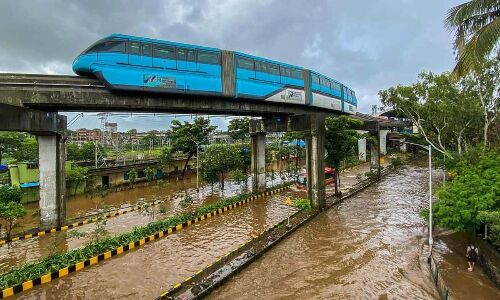Live
- Rajnath Singh lauds efforts of Indian Army training institutes
- Ganja Smuggling Racket Busted in Suryapet District
- After snowfall, CM Omar Abdullah monitors restoration process in Kashmir
- Farmers' Welfare Scheme to Be Implemented During Sankranti in Telangana
- Saints hail PM Modi as a champion of Sanatan Dharma ahead of ‘Mahakumbh’
- HIL 2024-25: Coach Altenburg eyes unique 'playing style and identity' for Kalinga Lancers
- Year-Ender: LWE saw significant decline in 2024 as India set sights on eradication by 2026
- Santosh Trophy: West Bengal storm into final with 4-2 win over Services
- Attack on 'Drinker Sai' Movie Director by Manten Satyanarayana Fans in Guntur
- Delhi voters don’t want AAP’s ‘half government’: Vijender Gupta
Just In

NatConnect raise concerns as eco sensitive zones were allotted for infrastructure projects in Navi Mumbai
Navi Mumbai being a planned city is better placed than many others to work on a climate action plan. Instead of confrontation, the stakeholders could put their heads together and chalk out an agenda for sustainability and contribute to the nation's goal towards zero carbon emissions
Mumbai: Amid green groups stressing on the need to immediately stop degradation of the environment, realtors have agreed to work with all stakeholders towards a city climate action plan.
Participating in a panel discussion on 'balancing development with environment', on the eve of the World Environment Day on Saturday night, the two sides have called for clarity on the policy framework and the government agencies such as CIDCO and MMRDA incorporating climate control the development plans.
The discussion was organised by NatConnect Foundation, Navi Mumbai First and CREDAI MCHI Youth at Navi Mumbai Merchants Gymkhana and anchored by realty-focused professional Jayashree Kurup.
NatConnect Foundation Director, BN Kumar, recalled that Navi Mumbai as a planned city had made a good beginning 50 years ago, but today the planner seems to have forgotten the original vision by neglecting the need to conserve nature, particularly the mangroves and wetlands. Eco sensitive zones have been allotted for infrastructure projects, he said.
Kumar called for accountability on the government officials for the result of destruction of mangroves and burial of wetlands which is already causing floods in Uran region.
Navi Mumbai First President Rajesh Prajapati sought to dispel the impression that the developer community is anti-environment and said most projects are now focusing on rain water harvesting, solar power and waste recycling. "We are ready to work with environmental groups on conserving mangroves and wetlands," Prajapati, who is the Founder Chairman of CREDAI MCHI Raigad.
"The impact of neglecting the environment by all project proponents particularly JNPT, NMSEZ and CIDCO is going to be disastrous," Nandakumar Pawar, Head of Ekvira Aai Pratishtan, cautioned. The widespread encroachment into eco-sensitive areas such as mudflats and wetlands has not only impacted intertidal water flow but the lives and livelihoods of the fishing community, he said.
Pawar, who is fighting a series of legal battles against the violations, pointed out that Uran villages are forced to face unseasonal floods due to the blatant interference with the natural flow of tidal water through creeks and wetlands.
Deep Rajpal, President of CREDAI MCHI – Uran Dronagiri, pointed out that change in CRZ rules after the commencement of work impacted several real estate projects which are fighting for occupancy certificates now. Many of these buildings have come up on plots allotted to the project-affected people as compensation for surrendering their lands for the development of Navi Mumbai.
Israel Shaikh, President of CREDAI MCHI Youth, said developers normally go by local planning agencies with the assumption that all aspects including the environment are clear. He asked as to why developers could be held responsible if environmental issues crop up after issuing the commencement certificates?
Shaikh also stressed that it is high time that all stakeholders worked together in the interest of the environment.
Kharghar-based activist Jyoti Nadkarni wondered as to how many developers opposed the anti-environment Navi Mumbai International Airport project which is flattening many hills, destroying mangroves and leading diversion of three rivers. She advocated that realtors must also consider all environmental aspects before taking up projects.
Jayashree Kurup, kick-starting the discussion, said Navi Mumbai being a planned city is better placed than many others to work on a climate action plan. Instead of confrontation, the stakeholders could put their heads together and chalk out an agenda for sustainability and contribute to the nation's goal towards zero carbon emissions.

© 2024 Hyderabad Media House Limited/The Hans India. All rights reserved. Powered by hocalwire.com







